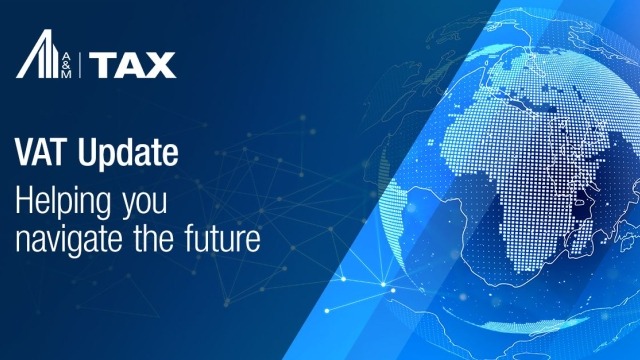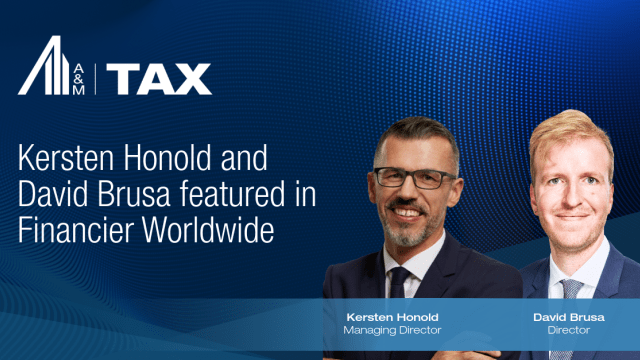EU VAT Quarterly Wrap-up –– Q2 2025
In this Q2 2025 edition of our VAT Quarterly Wrap-up, we provide our analysis on three cases at the CJEU potentially shaping the VAT landscape across the EU. Alongside these cases, we highlight a number of new CJEU questions and selected developments relevant for companies active in EU Member States
Featured CJEU Cases
1. CJEU case C 726/23, SC Arcomet Towercranes SRL (Opinion of AG): Transfer Pricing Adjustments and Impact on VAT
Held (in essence)
On April 3, 2025, Advocate General (AG) delivered its opinion on case C 726/23 (Arcomet). The case addresses the interaction and potential impact of Transfer Pricing (TP) adjustments on the taxable VAT amount of the underlying transactions performed by related parties.
The AG concluded that the question of whether TP adjustments are subject to VAT should be assessed on a case-by-case basis, so there is not a general Yes/No answer, for several reasons but primarily because there are different types of TP adjustments and not all of them may accommodate to the VAT Directive requirements to be deemed as part of the consideration for supplies.
Therefore, it must be examined whether a supply has been made for consideration and particularly if there is a legal relationship between the supplier and the recipient pursuant to which there is reciprocal performance and there is a direct link between the supply and the consideration received as a result of the adjustment.
In the Arcomet case, the AG understood that the abovementioned requirements were met, so he proposes that the answer of the CJEU should be positive, and therefore considers that this concrete TP adjustment should be subject to VAT.
Implications
Despite that the AG opinion is not binding for the CJEU, companies must be prepared for a decision of the Court that considers TP adjustments as subject to VAT under certain conditions, analyzed on a case-by-case basis.
It is worth noting that this is the first time the Court will analyze TP adjustments and VAT implications, despite the Court addressed TP adjustments in the field of customs valuation (well-known case Hamamatsu Photonics, Case C-529/16; and more recently Tauritus UAV, Case C-782/23). Besides, it would be also necessary to follow upcoming CJEU cases somehow related to this (e.g., Stellantis C 603/24), as they may further clarify VAT implications of TP adjustments.
It is clear that this topic is becoming increasingly more important for large groups and tax administrations.
Recommended Actions
We recommend reviewing the intercompany agreements and conducting a targeted analysis to determine whether the current TP adjustments may fall within the scope of VAT. It would also be advisable to revisit the current position of the local tax authorities in each relevant jurisdiction to assess whether it may be appropriate to revise the existing policies and consider if a voluntary disclosure would be advisable.
2. CJEU Case C232/24, Kosmiro (Opinion of AG): VAT Treatment of Factoring and Arrangement Fees
Held (in Essence)
On April 3, 2025, the Advocate General (AG) delivered his opinion in case C232/24 (Kosmiro). The case addresses whether factoring commissions and arrangement fees charged in connection with both invoice and trade factoring should be subject to VAT or may benefit from the VAT exemption for financial services under the EU VAT Directive.
The AG concluded that both factoring commissions and arrangement fees constitute remuneration for services provided under the VAT Directive and are therefore subject to VAT. The reasoning is that factoring activities, whether structured as invoice factoring (financing based on receivables) or trade factoring (sale of receivables), inherently involve debt collection, which is excluded from the VAT exemption. The AG considered that these fees represent payment for a single, indivisible supply related to the collection of receivables, rather than exempt financial services such as the granting of credit.
Implications
Although the Advocate General’s opinion does not have a binding authority on the CJEU, its adoption could impact the VAT treatment of structured finance services across the EU. In particular, the inclusion of a debt collection element within a service package, which is quite common, may result in the full or partial application of VAT to fees that are currently exempt in some Member States. Nonetheless, the broader implications for the financial sector will depend on whether the CJEU’s final decision extends beyond the specific context of invoice and trade factoring considered in this case.
Recommended Actions
Review current structured finance arrangements and their VAT treatment, with particular attention to jurisdictions where VAT exemptions are currently applied. As a part of this review, consider the potential implications of the pending A Oy case (T-184/25), which addresses the VAT treatment of loan servicing in securitization structures. The outcome of this case may further influence the VAT position for servicing fees and similar arrangements. For additional context, please refer to the update below.
3. CJEU case C-744/23, Zlakov (Opinion of AG): Taxability of Contingency Fees
Held (in essence)
On May 8, 2025, the AG delivered her opinion in the case C 744/23 (Zlakov). The case addresses the question whether a lawyer receives a taxable supply where
they are remunerated on a no-win no-fee basis. Under the circumstances which gave rise to the referral, the amount of the payment was fixed by statute and to be paid not by the client but by the unsuccessful party to the litigation.
The AG considered that none of the features of the arrangement could break the link between the services provided by the lawyer, on the one hand, and, on the other hand, the remuneration received. Most critically, the AG held that the mere uncertainty of the consideration would not undermine its link to the supply for which it was received. To the extent that the judgment in Baštová (no supply where a horse race winner receives a prize) suggested otherwise, the AG distinguished it based on its facts and sought to downplay the judgment’s argument that a “degree of uncertainty” would break the link between supply and payment.
Implications
In most Member States, taxing contingency fees or other uncertain payments is the general practice anyway. If the Court follows the AG’s opinion, this should therefore not lead to any revolutionary changes. However, where taxpayers currently rely on Baštová as authority allowing for the non-taxation of other uncertain payments, e.g., distributed profits in return for identifiable supplies, the case has the potential to undermine such reasoning.
Nevertheless, it should be stressed that the AG’s opinion in some ways radically parts with the Court’s precedent, hence it is not too likely that the CJEU will follow all aspects of the AG’s reasoning.
Recommended Actions
Taxpayers who currently do not impose VAT on fees that are contingent on uncertain events should closely monitor further developments in the case.
Other Developments Relevant for EU Member States
CJEU – New referral – 100 Percent Ownership Requirement for VAT Grouping
In the Sampension Livsforsikring case (T-268/25), the General Court of the EU has been asked to determine whether a Member State may require 100 percent ownership as a condition for VAT group registration under Article 11 of the EU VAT Directive. This case is particularly relevant for jurisdictions (such as Denmark) that apply a stricter ownership threshold than most EU Member States, and its outcome may influence how closely bound entities must be to qualify for VAT grouping across the EU.
CJEU – New Referral – VAT Exemption for Servicing Loans
In the A Oy case (T-184/25), the General Court of the EU has been requested to rule whether, and on what basis, a VAT exemption still applies after a transfer of the loans by the originator. This case is highly relevant for securitization structures in countries where the VAT exemption only applies when the servicing of the loans is carried out by the originator (e.g., the Netherlands and Spain).
Germany – Revised E-invoicing Draft Guidelines
On June 25, Germany’s Federal Ministry of Finance (BMF) published a revised draft of its administrative guidance on mandatory e-invoicing for domestic B2B transactions. Most critically, the Ministry clarified that technical errors in e-invoices do not invalidate them for input tax deduction under certain circumstances. Read more here.
Germany – Federal Fiscal Court Granted Permission to Appeal on Voluntary Payments for Free Online Content
By order dated May 19, 2025, the German Federal Fiscal Court granted permission to appeal a lower court’s judgment holding that voluntary payments to online content providers (e.g., through “support us” buttons) are not consideration subject to VAT. The forthcoming judgment may have a significant impact on businesses relying on voluntary contributions. Read more here.
Spain – Local Branches Can Be Treated as Separate Taxable Persons Outside a VAT Group
The Spanish tax authorities consider local branches to be separate taxable persons for VAT purposes if they are deemed sufficiently independent – even outside a VAT group. A remarkable shift that reverses the logic of FCE Bank. This is highly relevant for companies with a limited right to recover input VAT. Read more here.
Spain – Reduced VAT Rate for Home Repair Services
The Spanish Supreme Court has ruled that the reduced VAT rate of 10 percent for home renovation or repair services is only applicable when the contract is entered directly between the homeowner and the contractor. In other words, the standard VAT rate of 21 percent applies when the cost of the repair is covered by a home insurance company that enters into an arrangement with the supplier. However, the 10 percent rate may still apply if the insurance merely reimburses the homeowner for the repair costs that he has contracted. Insurance companies may need to review their current arrangements to ensure compliance with this interpretation in order to apply VAT reduced rate (considering that it implies a cost for the insurance company).
The Netherlands - RETT Demerger Exemption
Under the Real Estate Transfer Tax (“RETT”) demerger exemption, a demerger of real estate is in principle exempt from RETT, provided the demerger is not primarily aimed at avoidance or deferral of tax. As of July 1, 2025, more restrictive requirements apply.
The Netherlands - VAT Policy for Holding Activities
In 2024, the Dutch State Secretary of Finance issued two new policy decrees in relation to VAT grouping, and the acquisition, holding and sale of shares. Both decrees entered into force on July 1, 2025. These changes are relevant for all businesses with holding structures through the Netherlands and (private equity) investors involved in acquisitions and/or sales involving Dutch Target entities. Read more here.
Want to know more?
Our Global Indirect Tax team at Alvarez & Marsal is ready to help you evaluate your exposure and design a protective VAT strategy.







